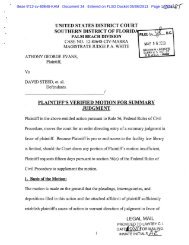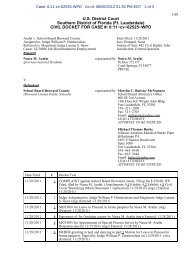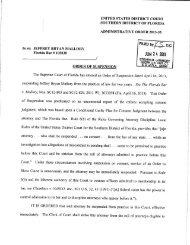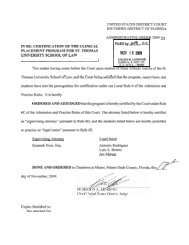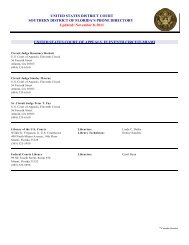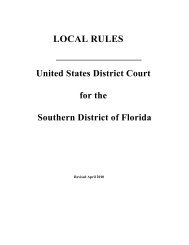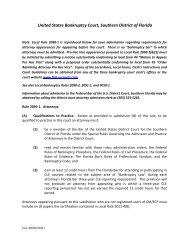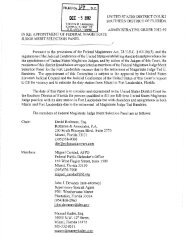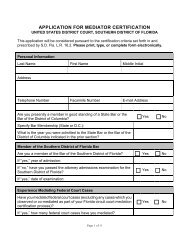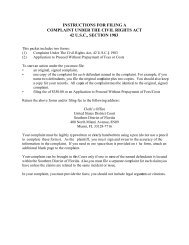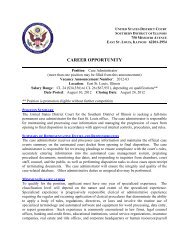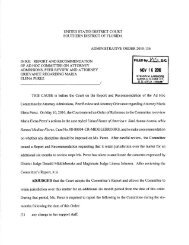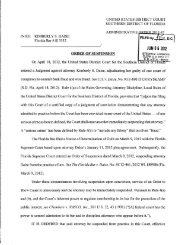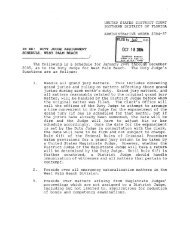JAN j 6 2010 - United States District Court
JAN j 6 2010 - United States District Court
JAN j 6 2010 - United States District Court
You also want an ePaper? Increase the reach of your titles
YUMPU automatically turns print PDFs into web optimized ePapers that Google loves.
(1996)[I.] The "attempt to confer" language is added to mirror the<br />
obligations imposed by Federal Rule of Civil Procedure 37(a)(2)(A) and<br />
(B) and in recognition of the circumstance in which counsel for the<br />
moving party has attempted to confer with counsel for the opposing party,<br />
who fails or refuses to communicate. Violations of the Local Rule,<br />
whether by counsel for the moving or opposing party, may be cause to<br />
grant or deny the discovery motion on that basis alone, irrespective of<br />
the merits of the motion, and may justify the imposition of sanctions.<br />
The sanctions language is modeled after Federal Rules of Civil Procedure<br />
26(g)(3) and 37(a)(4).<br />
(1998) Local Rule 26.1.G.2 is amended to reflect the <strong>Court</strong>'s approval of<br />
"form" interrogatories which comply with the subject limitations of the<br />
rule. Prior Local Rule 26.1.H, regarding motions to compel, is<br />
renumbered Local Rule 26.1H.2. Local Rule 26.2.H.I is added to ensure<br />
that discovery motions are filed when ripe and not held until shortly<br />
before the close of discovery or the eve of trial. Local Rule 26.1.K is<br />
added to limit depositions to six hours absent <strong>Court</strong> order or agreement<br />
of the parties and any affected non-party witness. The rule is adopted<br />
after an eighteen month pilot program was implemented pursuant to<br />
Administrative Order 96-26.<br />
(2001) Local Rules 26.1.A, B, F, G and K are amended to conform with the<br />
December 2000 amendments to Federal Rules of Civil Procedure 5, 26 and<br />
30. Local Rule 26.1.1 is amended to make clear that the obligation to<br />
confer in advance of moving to compel production of documents,<br />
electronically stored information or things sought from a non-party by<br />
subpoena includes consultation with all parties who may be affected by<br />
the relief sought and with the non-party recipient of the subpoena.<br />
(2003) The amendment to Local Rule 26.1.G.3 is based on N.D. Okla. Local<br />
Rule 26.4(b) and eliminates the requirement to include in a privilege log<br />
(1) communications between a party and its counsel after commencement of<br />
the action, and (2) work product material created after commencement of<br />
the action.<br />
(2004) Local Rule 26.1.1 is amended in conjunction with the amendment of<br />
Local Rule 7.1.A.3 to avoid confusion and clarify pre-filing conference<br />
obligations.<br />
(2005) Local Rule 26.1.H.2 is expanded to apply to motions to compel<br />
compliance with subpoenas for production or inspection issued pursuant to<br />
Federal Rule of Civil Procedure 45 (c) (2) (B).<br />
(2007) Section H.3 added to apply to protective orders as well as motions<br />
to compel. Section H.2 clarified.<br />
(2009) Local Rule 26.1.B amended to exempt notices of depositions and<br />
notices of serving subpoenas from the filing requirement. Local Rule<br />
26.1.F.2 added to ensure that discovery is completed prior to the<br />
discovery cutoff date and to avoid a situation in which discovery<br />
requests are propounded just prior to the cutoff date or depositions are<br />
noticed to occur after the cutoff date. Local Rule 26.1.G.4 eliminated<br />
57



